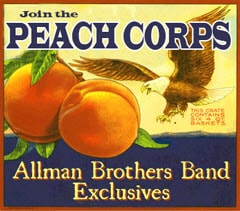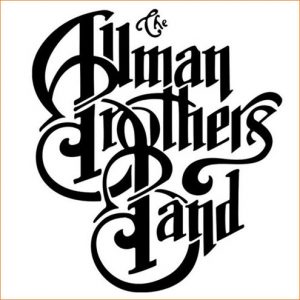TWO-CD STAND BACK: THE ANTHOLOGY FEATURES ALL THE CLASSICS
AND MORE WITH 32 RECORDINGS
Thirty-five years after their recording debut, there is still no other group like The Allman Brothers Band–authors of an indispensable style of American music that became known as Southern Rock, they grew into a musical icon culminating with their 1994 induction into The Rock and Roll Hall of Fame. Now the Brothers have a retrospective like none other in their lengthy history.
The two-CD Stand Back: The Anthology (Hip-O/UMe), released June 8, 2004, is the first collection to feature tracks spanning The Allman Brothers Band’s entire 35 years (1969-2003), from their groundbreaking work on Capricorn until moving on to Arista in the early ‘80s followed by Sony in the ‘90s and their current Sanctuary-distributed, self-owned Peach Records. These 32 recordings, each newly digitally remastered, include at least one from each of their 13 studio albums plus the quintessential Live At Fillmore East. The package also boasts a deluxe 24-page color booklet containing numerous photos, an essay and detailed credits.
Brothers Gregg (vocals, keyboards) and Duane Allman (guitars), Dickey Betts (guitars, vocals), Berry Oakley (bass), and Butch Trucks and Jai Johanny Johanson (later known as Jaimoe) (drums) formed the band in Jacksonville, FL, in March of 1969 before moving north to Macon, GA and quickly debuting with The Allman Brothers Band and its “Whipping Post,” “Dreams,” “It’s Not My Cross To Bear,” “Trouble No More” and “Don’t Want You No More.” 1970’s Idlewild South followed with “Midnight Rider,” “Revival” and “Hoochie Coochie Man.”
A mix of triumph and tragedy ensued. Live At Fillmore East (1971) went Top 15 with “Statesboro Blues” and “In Memory Of Elizabeth Reed,” contrasted by Duane’s motorcycle accident death weeks after the two-record set’s release. Then Eat A Peach (1972), Top 10, highlighted “Melissa,” “Stand Back,” “Blue Sky,” “Ain’t Wastin’ Time No More,” “Little Martha” and a live “One Way Out.” But then Oakley died in a motorcycle crash near the site of Duane’s accident.
Brothers And Sisters (1973) followed, spawning the #2 pop hit “Ramblin’ Man.” This album also featured “Come And Go Blues,” “Jessica,” “Wasted Words” and “Southbound,” and promptly went to #1. From 1975’s Top 10 Win, Lose Or Draw the title track and “Can’t Lose What You Never Had” are included.
After a reformation in 1979, Enlightened Rogues, with “Crazy Love” and “Just Ain’t Easy,” again went Top 10. 1980’s Reach For The Sky included “Hell & High Water” and 1981’s Brothers Of The Road “Never Knew How Much (I Needed You).” With a second reformation, they headed back into the studio in 1990 to record Seven Turns, producing radio airplay favorites “Good Clean Fun” and “Seven Turns.”
They followed with relentless annual touring and successively well-received live and studio recordings, among the latter are Shades Of Two Worlds (1991) with “End Of The Line,” the gold-certified Where It All Begins (1994) with “No One To Run With” and most recently Hittin’ The Note (2003) with “High Cost Of Low Living.” Concert appearances at Woodstock ’94, the Rock and Roll Hall of Fame inaugural, Bonnaroo, and the H.O.R.D.E. Festival; numerous television appearances, and being awarded a Grammy are among the many highlights of the past 15 years.
Today, The Allman Brothers Band’s current incarnation has been embraced by both their original fans, who have been with them for 35 years, as well as a new, young audience weaned on jam acts who draw inspiration from the Brothers’ vintage recordings, cornerstones in the American rock pantheon.



